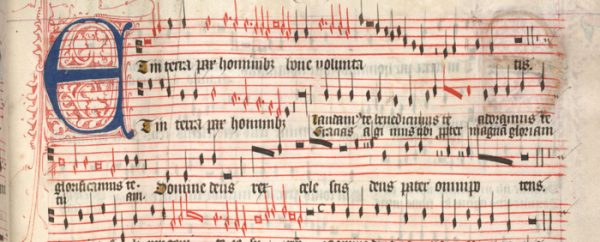 Story by Erin Pihl, SMTD Publicity Intern
Story by Erin Pihl, SMTD Publicity Intern
In the early thirteenth century, New Year’s Eve wasn’t quite the elaborate celebration of fireworks and various renditions of "Auld Lang Syne" we might see today. Instead, the coming of the new year was celebrated by the Feast of Fools and a performance of a liturgical drama.
On Nov. 16, Dr. Joel Bacon, professor of organ and liturgical studies, presents The Play of Daniel at a Medieval Music Concert. Attendees will have the unique privilege of experiencing a thousand-year-old musical genre unlike anything they’ve heard before. “When people think of medieval music, they may think it’ll be really serious and heavy but this was supposed to be a very lighthearted, festive kind of play that the choristers put on at the Feast of Fools,” Bacon says.
The drama will closely follow the biblical story of Daniel from his interaction with Belshazzar, the King of Babylon, to his fate in the lion’s den. Originally written between 1227 and 1234, the play is part of a series of liturgical pieces composed for churches in the middle ages. “They’re like little mini musicals or the earliest opera” Bacon says, adding, “The one [The Play of Daniel] we’re doing is possibly the most famous of all of them and one of the most detailed, and I think one of the most enjoyable.”
The age of this piece makes it difficult to determine what role instruments may have played in the performance, causing Bacon and his cast to improvise in some places. Fortunately, this drama is one of the few surviving texts that includes both the script and lyrics. “The music sounds at times like Gregorian chant - it’s all going to be pretty much accapella. We don’t know how they used instruments back then, we don’t have music notated specifically for instruments until much later” Bacon says, later equating the distinctive composition of the music to a “medieval drinking song.”
If the lack of instrumentation didn’t prove difficult enough, the piece also so happens to be entirely Latin and French, something Bacon wasn’t sure his cast would be up for. The performance will be done by the graduate seminar in medieval music history, which Bacon teaches. Speaking about the class he says, “A course like that can be really dry and boring. I was hoping that by involving them in a production of real music that they’d get a better sense of what this music is about.”
This project is uncharted territory for them all, Bacon included. “When I decided to do this in the spring, I had no idea who’d be taking the course or whether I had people in the class who liked to sing or what. So, it’s been a nice surprise that the students are enjoying singing and enjoying a project like this,” Bacon says.
Composed of just nine students, the cast will be accompanied by a few outside vocalists and faculty members such as John Carlo Pierce, the assistant professor of voice and a lyric tenor, who will play the lead role of Daniel. Pierce is known internationally for both his acting and exceptional voice, making him an ideal candidate for the role.
“John has many years of experience singing professional opera, and I think a role like this is probably different for him but I think the process of learning and performing something like this is very familiar to him,” Bacon says.
His experience will no doubt help to elevate the powerful story of Daniel. In the well-known Book of Daniel, the character faces an unfortunate fate after failing to comply with the law of the land and praying to a God higher than Belshazzar. Bacon recalls Daniel’s reaction to his punishment as the “emotional high point of the piece” saying, “I really like the moment when Daniel is going to be thrown into the lion’s den and he has this kind of lament and I think it’s really a beautiful moment.”
As the cast includes a non-traditional co-ed cast, the use of the harp, and electric lighting, the performance may not be an exact depiction of medieval times. Still, the show is definitely worth checking out.
“I don’t think people should come expecting a polished opera styled performance. I don’t think this was the original spirit of this piece, which was written by the choristers of a cathedral for this feast. It wasn’t meant to be put on stage a thousand years later as a piece of opera,” Bacon says.
Instead, expect a performance sure to widen your range of musical understanding, and possibly, a surprise role by Dr. Joel Bacon himself.
Ticket Information
Tickets for the performance are no charge for Full-fee paying CSU students, $3 for youth (under 18), and $12 for seniors (62+), and $14 for adults. Tickets are available at the University Center for the Arts (UCA) ticket office in the UCA lobby Monday through Friday, 3:30-5:30 p.m. and 60 minutes prior to performances, by phone at (970) 491-ARTS (2787), or online at www.CSUArtsTickets.com.


